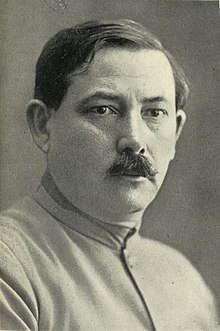
Back ميخائيل بورودين Arabic مايكل بورودين ARZ Міхаіл Маркавіч Барадзін Byelorussian Михаил Бородин Bulgarian Mikhail Markovitj Borodin Danish Michail Markowitsch Borodin German Miĥail Borodin Esperanto Mijaíl Borodín Spanish Mihail Borodin Finnish Mikhaïl Borodine French
Mikhail Borodin | |
|---|---|
 1920s portrait of Borodin | |
| Born | Mikhail Markovich Gruzenberg 9 July 1884 |
| Died | 29 May 1951 (aged 66) |
| Other names | Michael Gruzenberg Michael Borodin |
| Occupation(s) | Comintern agent, military and political advisor |
| Organization | Communist International |
| Political party | General Jewish Labour Bund (1900–1903) Bolsheviks (from 1903) |
| Other political affiliations | Chinese Communist Party Kuomintang |
| Spouse | Fanya Orluk |
| Children | Fred Borodin Norman Borodin |
Mikhail Markovich Gruzenberg,[a] known by the alias Borodin[b] (9 July 1884 – 29 May 1951), was a Bolshevik revolutionary and Communist International (Comintern) agent. He was an advisor to Sun Yat-sen and the Kuomintang (KMT) in China during the 1920s.
Born in a rural part of the Russian Empire (now Belarus), to a Jewish family, Borodin joined the General Jewish Labour Bund at age sixteen, and then the Bolsheviks in 1903. After being arrested for participating in revolutionary activities, Borodin fled to America, attended Valparaiso University, started a family, and later established an English school for Russian Jewish immigrants in Chicago. Upon the success of the October Revolution in 1917, Borodin returned to Russia, and served in various capacities in the new Soviet government. From 1919, he served as an agent of the Comintern, travelling to various countries to spread the Bolshevik revolutionary cause. In 1923, Vladimir Lenin picked Borodin to lead a Comintern mission to China, where he was tasked with aiding Sun Yat-sen and his Kuomintang. Following Sun's death, Borodin assisted in the planning of the Northern Expedition, and later became an integral backer of the KMT leftist government in Wuhan.
Following a purge of communists from the Kuomintang, Borodin was forced to return to the Soviet Union in 1927, where he would remain for the rest of his life. He once again served in various positions within the Soviet government, and later helped found the English-language Moscow News newspaper, of which he would become the editor-in-chief. During the Second World War, he additionally served as editor-in-chief of the Soviet Information Bureau. Amidst rising antisemitism in the Soviet Union during the late 1940s, Borodin was arrested and deported to a prison camp. He died in 1951 and was officially rehabilitated in 1964.
Cite error: There are <ref group=lower-alpha> tags or {{efn}} templates on this page, but the references will not show without a {{reflist|group=lower-alpha}} template or {{notelist}} template (see the help page).